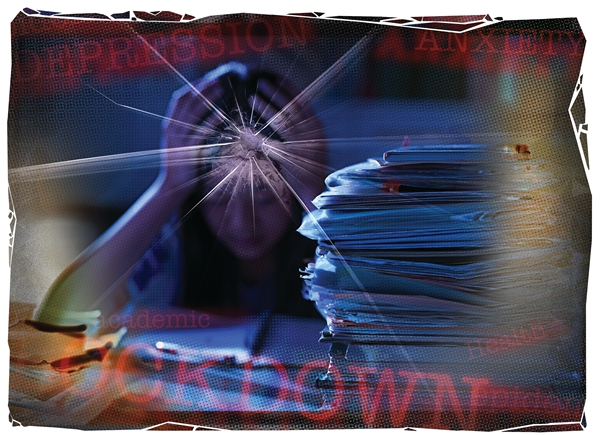 |
[Photo provided to China Daily] |
Far from being just a health and economic crisis, the COVID-19 pandemic has been an educational one as well
Lock anybody or anything in a cage for any length of time and before long their captivity is likely to start taking a hefty psychological toll on them.
Being forced to stay home during the COVID-19 may not have been quite as bad as being caged, but there is no doubt that forced confinement will have affected many people in many different ways and to different degrees.
Among them are students returning to classrooms whose mental health care will need to be given special attention as they switch from long-time social distancing to something more like routine life spent at close quarters with classmates and others.
The Ministry of Education and the national mental health hotline say some teenagers have experienced various degrees of fear, anxiety, depression and difficulty concentrating because of school closures, disruption to other activities and maintaining social and physical distancing, says Yu Guoliang, psychology professor with Renmin University of China in Beijing.
Emotional difficulties among children and adolescents are exacerbated by family stress, social isolation, with some facing disrupted education and uncertainty about their futures occurring at critical points in their emotional development, the World Health Organization says.
China Economic Net quoted Yu as saying anxiety about studying online, being bored, isolated and lonely at home and being addicted to mobile games have been the main factors affecting the mental health of young people.
In Guangdong province the local consumer council said that in the first three months of the year it had received more than 10,000 appeals for help from parents concerned about their children playing online games, the opportunities for such activities increasing markedly during the epidemic lockdown.
By March about 265 million students had switched to online courses in China, bringing the number of daily active users on multiple online education applications to more than 10 million each, the China Internet Network Information Center said.
In April the Ministry of Education issued advice on strengthening mental health education in the new term at primary and high schools nationwide. Schools should encourage pupils to play games involving emotion to help them learn to identify and adjust their emotions, it said. Junior high schools were urged to encourage students to strengthen socializing and express their feelings through communication, and senior high schools were urged to get their students involved in life education.
Taking the advice, many schools have adopted measures focusing on improving students' mental well-being to help build their resilience.
In late May, the Jiangsu Provincial Education Department prohibited teachers from revealing test scores of primary and junior high school students, and schools have been told not to give extra homework or classes to students that some may think would make up for the three-month-long school hiatus caused by COVID-19.
The Chinese Association for Mental Health has instituted a program offering free psychological health services to students, parents and teachers nationwide.
To help students get back to normal, Ma Hongwei, a psychologist, suggests that parents and teachers should encourage children to contact with their classmates and friends and get back to routines they had the epidemic.
Parents should lower their expectations about their children's academic performance and learn to control their emotions so any stress they feel will not spill over onto their children, he said.
The medical journal The Lancet warned in April that for children and adolescents with mental health needs, school closures mean a lack of access to the resources they usually have through schools, which are important coping mechanisms for them.
The pandemic has not been just a health and economic crisis but an educational one as well, and governments are grappling with the complexity of providing schooling remotely. More than 1.2 billion learners, accounting for more than 73 percent of enrolled learners globally, were affected at the height of the outbreak, UNESCO said. The organization's Director-General, Audrey Azoulay, said "the global scale and speed of the current educational disruption is unparalleled".
In a recent report the United Nations said the mental health and wellbeing of whole societies had been severely impacted by the crisis and needed to be dealt with urgently.